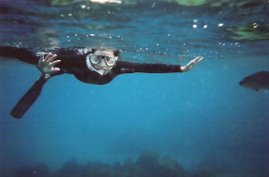 [above: Kabula on the left and smiling at the camera, and Katega on the right focusing on her drawings]
[above: Kabula on the left and smiling at the camera, and Katega on the right focusing on her drawings] [above: the view of the Mwanza valley in the mid-afternoon from the veranda next to my hotel room at Tai Five. I have no idea why this hotel is called Tai Five since it's supposedly Tanzanian-owned, though I can tell that it is constructed almost entirely using Chinese parts - and i don't know if that's related.]
[above: the view of the Mwanza valley in the mid-afternoon from the veranda next to my hotel room at Tai Five. I have no idea why this hotel is called Tai Five since it's supposedly Tanzanian-owned, though I can tell that it is constructed almost entirely using Chinese parts - and i don't know if that's related.]“Wao”is the way my colleague Jesca spells “Wow.” I have embraced it was the Kiswahili word for “wow!!!” (complete with three exclamation points). Jesca is a nurse at
She has two lovely daughters, Kabula, who is 3 years old, and Katega, who is 5 years old. Kabula and Katega are their “botanical names,” as Jesca describes it. These are their Kisukuma, tribal names. In short, these are the names that everyone at home calls them. Their “trade names” (also Jesca’s terminology) are Joyce and Jocelyn… or something strange and unfitting like that. These are the names used to make them fit in to their English medium pre-school. Nice Christian names. I call them Katega and Kabula.
I miss Katega and Kabula this weekend. We had spent Saturday last week at their house in Shinyanga, engrossed in a pile of origami paper, ripped and intact flapping cranes, half-smashed origami paper balloons, mini colored pencils, and scraps of notebook paper. Kabula had filled several sheets of notebook paper with an endless supply of “3”s drawn in every color represented by the colored pencil set. Katega mapped out a nice survey of the different objects and words she had learned in English, including “door” and “flower”, as well as a rainbow representation of the numbers from zero to 100. She read them all out to me. This, of course, was a sign that Katega trusted me. She and Kabula had spent the first two hours of our visit completely mute.
Jesca, not to be out-done by her daughters in the charming department, had also not just prepared dinner for us, but had also bought a bolt of star-patterned brown kitenge and made tunic tops for Jenny and me. There is very little that impresses me more than someone who can appreciate my obsession over kitenge and fabric arts.
We were supposed to be in Shinyanga this weekend. Indeed, I was looking forward all week to the prospect of spending time with Jesca, Katega and Kabula again. And Shinyanga was becoming familiar to me, as my home-base in this dry, red-earth dusty region. I know exactly where to get Azam Mini Choc ice cream bars. I know which kitenge stores will rip me off and which won’t. I know where to bring people for good old rice ‘n’ beans or ugali and grilled fish when they’re hungry. I know every nook and corner and quirk of room number eleven at the Karena Hotel.
Not only were we supposed to go to Shinyanga, we were also supposed to go to Maswa for mentoring next week. Maswa is a remote, rural district with roads that can only be navigated by 4-wheel drive vehicles. Everyone was excited to get a chance to spend time in this remote region, where providers were hungry for mentoring and teaching, where we knew our presence would be greatly appreciated and well-utilized.
But instead we are in Mwanza. One day before our return to Shinyanga, we were told by EGPAF that we no longer have any transportation for the Maswa district. The could spare a land cruise to bring us there straight away (and thereby not allowing us to stay in Shinyanga for the weekend) and then leave us stranded there. Wao! (That translates to “Wow!!!!”) EGPAF had already done this to us once, for the Kahama trip, but we mustered a taxi substitute. This time we couldn’t do that, since there are no 4-wheel-drive taxis around.
So Guy put his long, lanky Dutch leather-sandaled foot down and came up with an alternate plan. Jenny and I were on board too. Instead of going to do mentoring in Maswa and Bariadi, we are now flying out of Mwanza airport on Monday to go to the Kilimanjaro region. After we arrive and meet with the EGPAF folks there, we’ll piece together some mentoring visits for my final week in
I am not complaining about this change in plans. In fact, I prefer it. I had been sad when I was told at the beginning of my trip here that I would not be returning to the Kilimanjaro region to do follow-up mentoring at places where I knew people already. This added to my feeling of alienation in
Mwanza is also a delightful city. (“Delightful”? Where am I picking up this vocabulary?) No, really, it is truly delightful. It’s quite refreshing to be here after a week in the dude-town of Kahama. Somehow Mwanza reminds me of
Tonight we are picking up some vegetables from the local market and going to one of Jenny’s nurse practitioner school friends’ (Suzanna) homes to cook dinner. This will be the first time I’ve cooked since I left our










